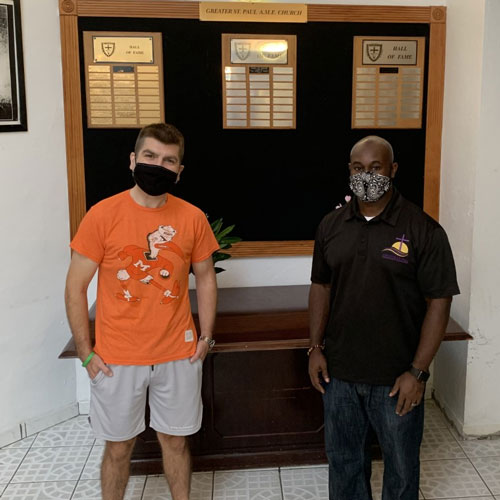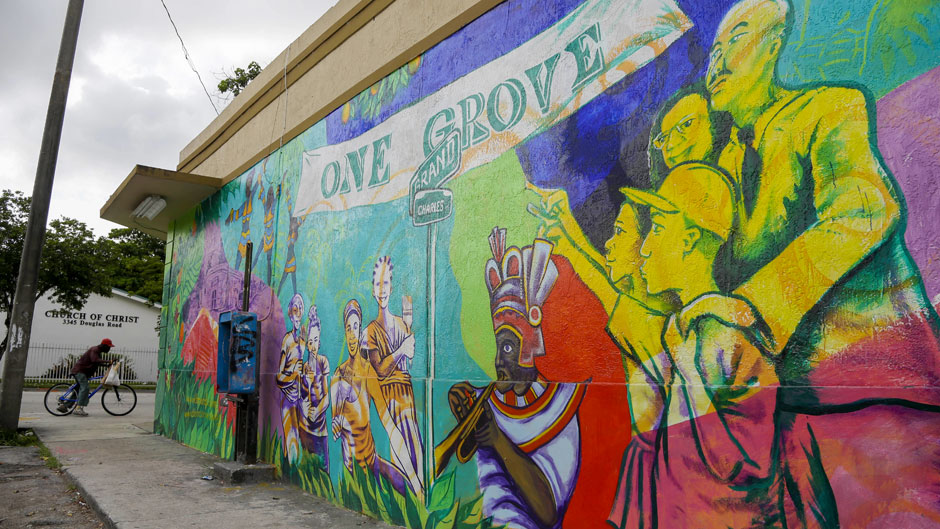It is a worship Sunday at Greater St. Paul A.M.E. Church in West Coconut Grove, and the Rev. Nathaniel Robinson III stands at the pulpit and addresses the congregation. He reminds them that the coronavirus, which has now killed more than 200,000 people in the United States, is still having a detrimental impact on the small African-American community where they live.
“Many people have lost their jobs. Many have been furloughed or are working fewer hours,” said Robinson, delivering his sermon via the internet, as the historic church entered its sixth month of virtual services to help stop the spread of the virus.
Rising unemployment is not the only consequence of the pandemic to hit West Grove residents hard. The community has also experienced higher COVID-19 positivity rates, mirroring nationwide data that show Blacks, Hispanics, and other minorities test positive for the virus at higher rates than whites.
But Robinson didn’t need statistics or public health experts to give him that information. When COVID-19 was just starting to spread across the U.S., he knew that West Grove would be one of the many marginalized communities that would bear the brunt of the pandemic. “Many of our residents are the janitors who clean up, the cashiers who bag groceries—they were among the first to get the virus, along with those with preexisting health conditions that made them especially vulnerable,” Robinson said.
Now, a University of Miami School of Law initiative, using data as a weapon, is helping to reduce COVID-19 positivity rates in West Grove as well as address and remedy the health disparities laid bare by the pandemic.
Partnering with Robinson and other pastors in the Coconut Grove Ministerial Alliance of Black Churches, as well as with the nonprofit coalition Grove Rights and Community Equity (GRACE), the project uses Florida Department of Health and U.S. Census track data to chart the spread of the virus in West Grove.
“Having the data is really the only way we can see and fight the virus,” said Timothy Loftus, a physician trained in emergency medicine and a third-year law student and fellow in the law school’s Center for Ethics and Public Service, who is spearheading the project.

As the data are compiled, Shirin Shafazand, professor of medicine at the Miller School of Medicine, who has been a team member on the project since its inception, and Loftus are analyzing the numbers, designing surveys, and planning for the implementation of interventions for community residents.
“We’d like to reach as many people who have had COVID and get an overall picture of how it impacted them,” Loftus said. “Where do they think they got it? What kind of care did they get? Do they live in a multigenerational household? Those are some of the things we want to find out.”
Preliminary figures show alarming health disparities and higher rates of underlying health conditions in West Grove, making residents more susceptible to the virus. “We’ve looked at the Census track from the east side of U.S. 1, which encompasses the West Grove, and then compared it to the track directly west of U.S. 1, which pulls in a fairly affluent area of Coral Gables,” Loftus said. “And we found exactly what we expected: higher incidents of diabetes, cardiovascular disease, respiratory disorders, you name it. Almost universally down the list, the comorbidities in the Census track that encompasses the West Grove are far worse than they are just across the street and countywide.”
The problems are not unique to that community but are also prevalent in other underserved enclaves throughout Miami-Dade County, from Overtown to Liberty City to Opa-Locka, Loftus explained. “We know that there are a whole host of reasons why minority communities are being hit hard by COVID-19,” he explained. “Many of the people who live there are in jobs that expose them to the virus, and many are dealing with underlying issues of poverty and access to health care.”
The project he is spearheading, “COVID-19: Evaluating Fault Lines in the Health of Our Communities and Developing Community-Centered Solutions,” has received a University of Miami Laboratory for Integrative Knowledge (U-LINK) grant and will establish an ongoing medical-legal community partnership to address health disparities. A documentary on the project’s work in West Grove will also be produced. Loftus is optimistic that a number of other researchers from across the University will join the project.
The initiative, said Tony Alfieri, professor of law and director of the Center for Ethics and Public Service, “provides a historic leadership opportunity for the University to marshal its resources across the fields of education, research, and policy to assist underserved communities of color in Miami and throughout the region.”
Area ministers have been indispensable in helping to get the project underway, providing the “ears on the ground and access to community members that will help guide the data,” Loftus stated.
Robinson, who is also chair of the board of directors for GRACE, said the project is badly needed. Eight of the parishioners at his church contracted the virus but have since recovered. He recalled that during the early days of the pandemic, few West Grove residents had access to COVID-19 testing. “The majority of our residents don’t have cars. They use public transportation, they walk, or they bike,” Robinson said. “In the beginning, there weren’t enough tests, and the testing that was being done was not located in underserved communities. Testing didn’t even come to our community until we were two-and-a-half months into the pandemic.”
His church helps organize COVID-19 testing at a local community center, provides affordable housing to low-income families, and assists parishioners in applying for jobless benefits.
Robinson has high hopes for the project and what it will accomplish. “When you can put the numbers in front of people, it gives weight to your argument that marginalized communities are being neglected when it comes to this pandemic,” he said. “I’m hoping this study will allow everyone to see what we in the West Grove already know.”

